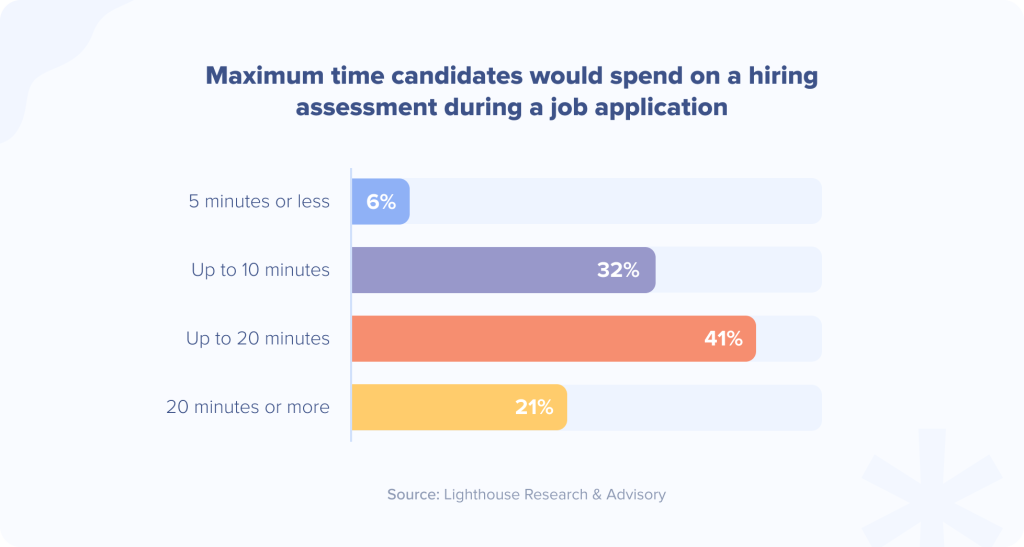
Subscribe for updates
Get talent acquisition best practices, trends, and news delivered directly to your inbox.
By entering your email, you agree to receive marketing emails from JobScore
Finding the right talent for your organization can feel like searching for a needle in a haystack. With a long list of candidates and only one job opening, hiring a qualified candidate means most employers are conducting four or more interviews over a 4-6 week period.
What if there was a way to streamline your hiring process, save precious time and resources, and consistently identify qualified candidates?
Enter skill assessments: the key to efficient and effective hiring.
In this article, we’ll explore how skill assessments can transform your recruitment strategy and help you build a more competent, diverse, and successful workforce.
What are skill assessments?
Skill assessments are a structured evaluation technique designed to measure a candidate’s abilities, knowledge, and aptitude for specific job-related tasks. By providing objective data on a candidate’s capabilities, skill assessments help you make more informed hiring decisions.
Assessments can take various forms, including:
By incorporating skill assessments into your hiring process, you gain valuable insights into a candidate’s potential performance on the job, helping you identify top talent more efficiently and effectively.
The benefits of using skill assessments in your hiring process
Incorporating assessments into your recruitment strategy allows you to unlock a range of benefits that not only save time and resources but also improve your quality hire.
1
Improved candidate quality
Skill assessments help you identify and focus on candidates who possess the specific abilities required for the job.
This means:
By using objective data to evaluate candidates, you’re more likely to find individuals who can hit the ground running and contribute to your organization’s success from day one. In fact, 56% of employers say that assessments improve their quality of hire.
2
Reduced bias in hiring
Unconscious bias can creep into even the most well-intentioned hiring processes.
Skill assessments offer a more objective way to evaluate candidates by:
This approach can help you build a more diverse and inclusive workforce, as 59% of employers agree that assessments enable more fair, unbiased hiring decisions.
3
Time and cost savings
One of the most significant advantages of skill assessments is their ability to save you time. In fact, 44% of employers agree that assessments enable faster hiring.
By quickly identifying candidates with the right skills and abilities, you can:
These time and cost savings can make a substantial impact on your bottom line.
4
Enhanced candidate experience
Skill assessments can be a great way to improve the candidate experience when implemented thoughtfully.
Here’s how:
By offering a more engaging and relevant recruitment process, you’re more likely to attract and retain top talent throughout your recruitment funnel.
5
Data-driven decision making
Relying on gut feelings for hiring decisions is no longer enough.
Skill assessments provide you with concrete data to:
This wealth of information allows you to make more informed decisions not just during hiring, but throughout an employee’s tenure with your organization.
Implementing skill assessments in your hiring process
Now that we’ve explored the benefits of skill assessments, let’s look at how you can effectively incorporate them into your hiring strategy.
1
Identify the key skills for each role
Before implementing any assessments, it’s crucial to:
This step ensures that your assessments are tailored to the specific needs of each role, providing you with the most relevant and valuable information.
2
Choose the right assessment
Plan your work assessment according to the skills you want to evaluate. For example, you might ask a communications candidate to write a press release, or a customer success candidate to do a role play that mimics real workplace situations.
Keep assessments brief, as only 21% of candidates say they’d spend more than 20 minutes on it.

About a third of employers (32%) rely on assessment providers to support their interview process. With a plethora of assessment options available, selecting the right tools for your needs is essential.
Consider factors such as:
Many assessment platforms offer free trials or demos, so don’t hesitate to test a few options before making a decision.
3
Determine when to use assessments in your hiring process
Skill assessments can be valuable at various stages of the recruitment process:
The best timing may depend on things like the volume of applications you receive, your candidate churn rate, and candidate feedback. Experiment to find the sweet spot that works for your organization.
4
Communicate clearly with candidates
Transparency is key when using skill assessments in your hiring process.
Be sure to:
Clear communication helps candidates feel more comfortable and prepared, leading to a better overall experience and more accurate results.
5
Analyze and act on the results
Once you’ve gathered assessment data, it’s time to put it to use:
Remember, skill assessments should be just one part of your overall evaluation process. Combine the results with interviews, reference checks, and other traditional hiring methods for a well-rounded view of each candidate.
6
Share assessment results with candidates
If not selected for a job, 42% of candidates would like to receive the results of a hiring assessment.
Taking the time to share results can:
This wealth of information allows you to make more informed decisions not just during hiring, but throughout an employee’s tenure with your organization.
Common challenges and how to overcome them
While skill assessments offer numerous benefits, they’re not without their challenges.
Here are some common obstacles you might face and strategies to overcome them:
1
Cost of assessments
Budget is the most common challenge, with 45% of employers reporting cost as a barrier to using assessments in their hiring process.
You can help justify the cost by exploring the risks of a poor candidate evaluation process:
2
Hiring speed
Time-to-hire is the second most common challenge, with 38% of employers saying they don’t want assessment to slow down the recruitment process.
To address this:
3
Assessment accuracy
Accuracy is another significant concern, with 27% of employers listing concerns about validity as a barrier to using assessments. Further, 70% cite accuracy or validity as the biggest concern when it comes to selecting a talent assessment to use.
To address this:
4
Candidate dissatisfaction
Nearly one in five employers (17%) say candidates don’t like assessments. This could lead to candidate churn and damage to your reputation.
To mitigate this:
You can also challenge this assumption directly, as 70% of candidates agree that assessments help them demonstrate their potential.
Final thoughts on embracing the power of skill assessments
As you navigate the challenges of modern recruiting, consider how skill assessments can transform your hiring process and help you build the high-performing team your company needs to thrive.
The key to success lies in choosing the right assessments for your needs, implementing them effectively, and using the results as part of a holistic evaluation process. With these strategies in place, you’ll be well on your way to revolutionizing your recruitment efforts and securing the talent that will drive your business forward.
Want to learn more about streamlining your recruitment process? Learn how JobScore can help.



